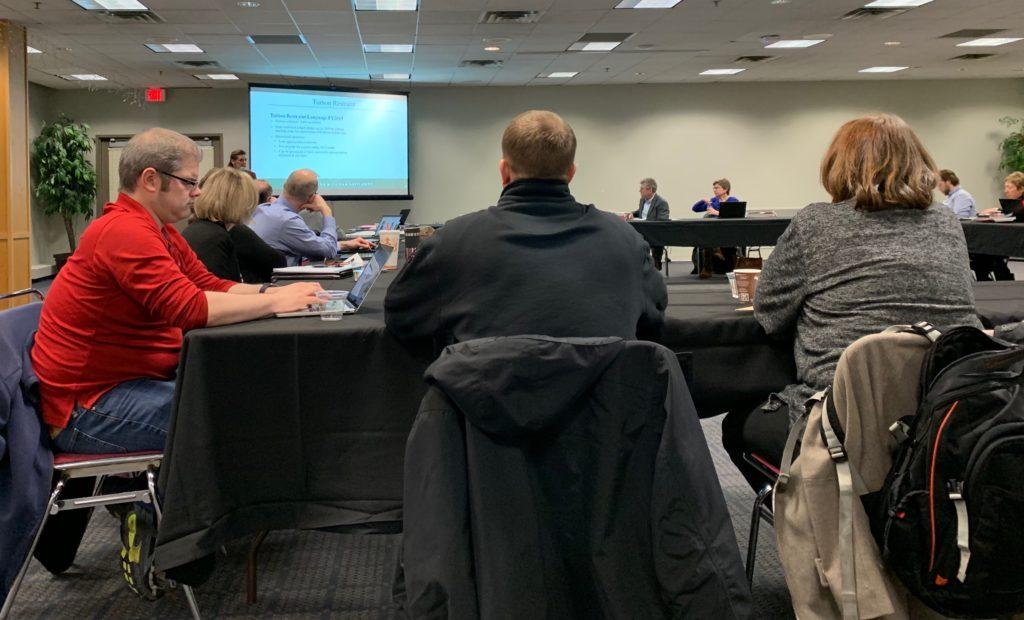Sophie Hillmeyer/NW
Caption: Members sit in on a Strategic Planning and Budgeting Advisory Committee meeting on Feb. 6 in the UC while Director of Government Relations Deanna Hemmila discusses changes in Michigan State Legislation.
A new committee to address the changing university held a meeting on Feb. 6 to discuss ways to improve relationships with legislators and communicating with the changing needs of college students in 2019.
The Strategic Planning and Budgeting Advisory Committee (SPBAC), was created by NMU President Fritz Erickson in 2016. Wednesday’s meeting began by addressing the four major external factors that play a role in planning for the university. These factors include university demographics, legislative changes, extended adolescence and student behavior and credential packaging moving students in and out of higher education, Dean of Academic Information Services Leslie Warren said.
“We recognize that those aren’t the only four big external trends that are impacting. There are other things in your fields that have potential to be major factors for our campus or higher education or Marquette,” Warren said.
The SPBAC meets monthly and is comprised of creative and innovative professors and administrators with the intent of addressing the university’s goals of change and strategic plans. Input comes from primary areas including consideration of strategic planning and proposals, development of planning and implementation processes and assisting offices in aligning other units to the strategic planning framework. The committee is currently co-chaired by Warren and AAUP President and biology professor Brent Graves.
The main goal of these meetings is determining if there are other factors that are going to impact the future of planning at NMU, Warren said.
The second factor, legislative changes, has created new challenges in areas that need additional education and new relationships, Executive Director of the Board of Trustees and Government Relations Deanna Hemmila said in her presentation titled, “Legislative Landscape.”
Things such as capital outlay project funding and school aid funding come from the Michigan State Legislature in Lansing and it is important for people from NMU to create a relationship with legislators, Hemmila said. There are many new members of the House and the Senate from a variety of different backgrounds who are not familiar with NMU so there is a learning curve for these new members, she added.
“It makes it really important that the board, the president, the leadership all have the same message for [legislators],”
Hemmila said.
In addition to new members of the legislature, there will be changes with Gov. Gretchen Whitmer’s administration and less money from the school fund going to higher education.
“We need to understand how this will impact funding at the university, continue to educate about our mission and figure out ways to partner with the state and reach goals,” Hemmila said. “There are a lot of unknowns right now as we look at how to plan strategy and budgeting as a university.”
Dean of Students Chris Greer began her discussion of extended adolescence and student development by outlining the traditional values of adolescence and explaining the difference in actions of adolescents and teenagers today versus 20 years ago. The main differences include less face-to-face interactions, the age people choose to start having families and employment. These changes create the need of extending adolescence beyond 18, which requires universities to change ways they connect with students, Greer said.
“Today’s 18 looks like the old 15. Today’s 26 looks like the old 18,” Greer said. “Are they really adults when they head to college?”
The reasons behind these changes vary greatly between students but can stem from parental involvement and modeling behaviors, smartphone use and easy access to online media, Greer said. Some solutions include a “pick one” campaign that encourages students to get involved with one organization or an on-campus job and more communicative advising processes. These new ideas and campaigns would help with student retention, Greer said.
“They just want to do less adult things. They’re not interested in adulting,” Greer said. “We need to rethink how we think about students. What does that mean for the services we’re giving? What should we change or do differently?”

























